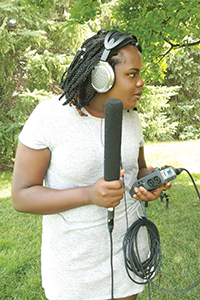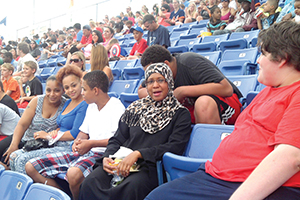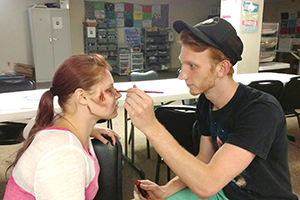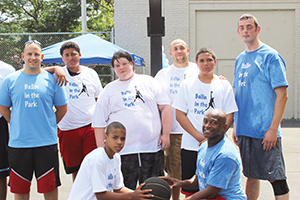By JULIE MINDA
It was about a year after the Capozzis adopted 13-year-old James Vargas that the concerning behaviors began. About three years ago, the Binghamton, N.Y., teen began skipping school and smoking marijuana with a trouble-bent group of friends. His grades slid.

Through discussions, he, his mother and school administrators decided the West Learning Center would be the best place for him. The alternative school for at-risk youth in nearby Apalachin, N.Y., uses individualized course work and character education to help students become "successful, productive citizens of tomorrow." High school graduation and employment preparation are primary goals. Parent involvement and connection with the community are central to the school's approach.
Vargas responded well to the change. He was open to making new friends and finding healthier ways to spend his time when he chose to take part in an extracurricular program run by Lourdes Youth Services of Binghamton. In the Binghamton Community and Schools Together program, or BCAST, Vargas spends time with other teens working to turn their lives around. The kids play sports, go on outings and have dinners together. Family members are invited to take part in many of the events. The group activities build interpersonal skills, and the program serves as a forum for the teens and their families to talk through their struggles to achieve stability, according to Vargas' mother, Rebecca Capozzi.

Capozzi is particularly grateful for the structured mentoring her son receives from Lourdes staff. "They call him out on negative behaviors, they emphasize the positive and keep tabs on him and check in. They give positive reinforcement" for doing well with improving his behaviors.
Now funded by a three-year, $1 million federal grant that began in September 2014, the intervention program is one of four main initiatives that Lourdes Youth Services operates in Broome County, N.Y., to help at-risk youth curb problematic behavior, including truancy, substance abuse, larceny, vandalism and gang activity. Funded primarily through government grants, the programs, in addition to BCAST, include mental health services for juvenile offenders, an after-school detention alternative program and substance abuse counselors for schools. Lourdes Youth Services, which serves both young men and young women, is part of Ascension's Lourdes Hospital of Binghamton.
Lifetime benefits
Ralphalla Richardson, who manages the initiative providing mental health services to juvenile offenders, said, "We want to get them in treatment now, while they're developing, and there's more chance of success. Perhaps we're saving them from being an adult with an untreated mental health concern."
Richardson said Lourdes Youth Services' programming helps "kids who find themselves in bad circumstances." Most with delinquent behavior have unstable home lives, she said. Richardson said the programs focus on youth taking responsibility not only for their past mistakes but also for their future successes.
Ann Marie Zumawtzak, a Lourdes Youth Services social worker who works with the program's juvenile offender clients and those with behavioral issues, said in many cases the youths' families have few resources, parents are overwhelmed and many do not trust social service providers who could potentially help them.

"There may be trauma that is systemic. It's how poverty can impact a family. You don't know where to get money for rent, you move a lot, you have limited income and you don't fit into the mainstream," Zumawtzak said. "These parents often don't have the resources to advocate for their kids."
Children from these backgrounds who are labeled as "bad kids," may have mental health or substance abuse issues that have gone undetected and untreated, said Zumawtzak.
She said the Lourdes Youth Services programs offer a safe place with firm boundaries and structured case management services to guide young people toward better choices and healthier paths. Richardson said staff find creative ways to engage and reward the youth and show them "there is a bigger world out there," by exposing clients to enrichment activities including sports, drama, art, hiking and mixed martial arts that their families may not normally be able to afford.
Intervention programs
Lourdes Youth Services' Detention Alternative After-School Program began as a pilot program in 2005. Participants must be referred by a judge, the Broome County attorney or a Broome County probation officer. It provides substance abuse education, coordination of social services and therapy. Richardson said youth in the program have "structured supervised time" aimed at developing social and academic skills. The program is a "last chance before nonsecure detention," according to information from Lourdes Youth Services. (Nonsecure detention is group home detention for lower-risk offenders.)

"The idea is that we provide something positive to do to replace the negative behavior," she said.
Funded mainly by Broome County's social services department, the after-school program enrolls about 40 young people annually. Richardson said its success is reflected in the fact that more than 90 percent of participants do not require detention placement, because they change their behavior for the better.
Lourdes Youth Services' Mental Health Juvenile Justice program offers similar services to people charged as juvenile delinquents or "persons in need of supervision" from a probation officer. Lourdes Youth Services uses state grant dollars to assess and treat these clients, and link them to social services. The program enrolls 64 people annually. Richardson said the program "is at its core a counseling program that primarily works with youth one-on-one for short-term counseling. … Social workers look to identify and develop strategies to deal with immediate mental health issues blocking the youth's progress." She said the program also helps parents advocate for services for their children.

Funded by the New York State Office of Alcoholism and Substance Abuse Services, the Student Assistance Program places Lourdes Youth Services counselors and substance abuse experts into high schools and middle schools in four Broome County school districts. They teach drug prevention classes, and they counsel students with poor attendance records, poor academic performance, substance abuse issues, gambling problems and/or significant problems relating to other people. Through ongoing individual counseling sessions, the counselors and substance abuse specialists help the students modify their behavior and identify and achieve goals.
'Worth something'
All of the programs track participants for a limited time after they no longer are using the services. In surveys the vast majority of prior participants say they've discontinued their problematic behaviors.
Zumawtzak said success is when participants find purpose and validation through Lourdes Youth Services' interventions. "One 15-year-old told me, 'You're the first person to tell me I'm worth something,'" she said.
Lourdes programming helps address substance abuse issues prevalent locally The programming that Lourdes Youth Services has developed to reduce or eliminate substance abuse among young people gets at a problem that has been escalating in recent years in Binghamton, N.Y., as the city's fortunes have declined, according to Lourdes Youth Services staff. Binghamton is a community of about 50,000 in southcentral New York near the Pennsylvania border. According to Ann Marie Zumawtzak, Binghamton once was a thriving industrial city, but with the loss of manufacturing jobs — especially in the 1990s — the city declined. Zumawtzak is a Lourdes Youth Services social worker who focuses on the program's juvenile offender clients and clients with behavioral issues. Two major floods over the past five years further depressed the region surrounding Binghamton, said Ralphalla Richardson, who manages Lourdes Youth Services' mental health services for juvenile offenders. The drug trade grew and crime increased during this time of decline, she said. Alcohol is the most abused substance by local youth, followed by marijuana. Richardson said heroin use is "an epidemic in the area." According to a June New York State Comptroller report, "Overdose deaths in New York related to heroin use reached a record high of 825 in 2014, a jump of more than 23 percent from the previous year and nearly 25 times the number of a decade earlier." Jill Alford-Hammitt manages a Lourdes Youth Services program that puts substance abuse counselors in schools. She noted that the depressed financial conditions in the community have degraded the tax base, so there have been cuts in some local school and government programs to help at-risk youth. Lourdes Youth Services has been able to secure county, state and federal grants — and to supplement that funding with Lourdes Hospital dollars — to shore up services for Binghamton's at-risk youth. |
